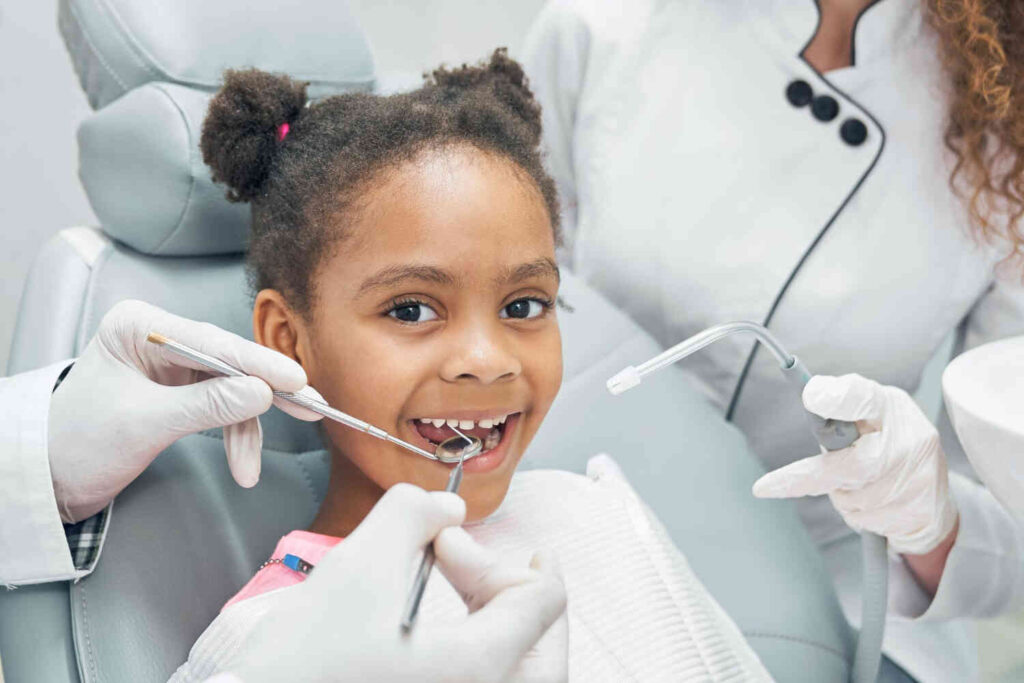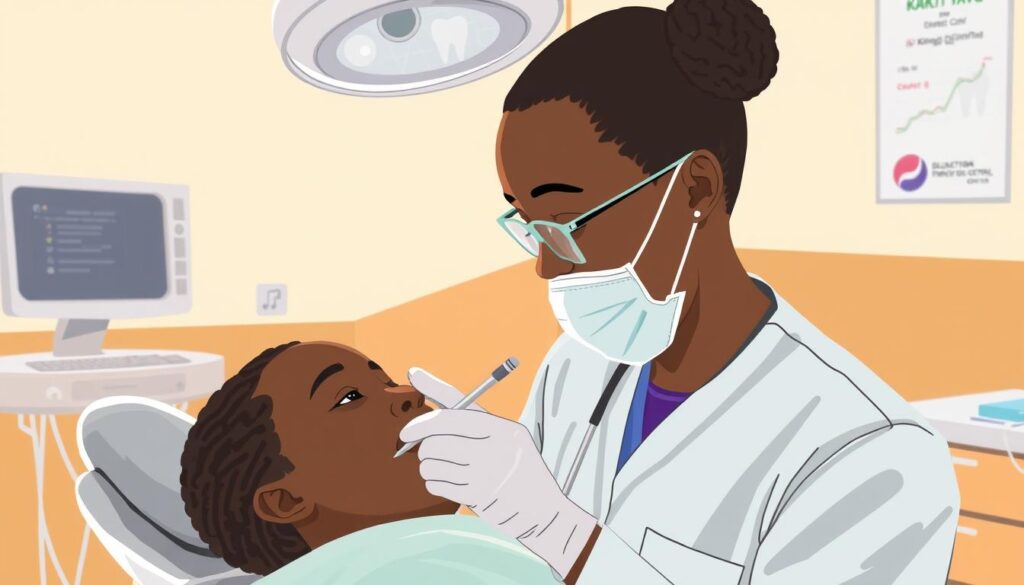When it comes to your child’s smile, early Pediatric Dentistry care isn’t just important—it’s essential. Pediatric dentistry is a specialized branch of dental care that focuses exclusively on the oral health needs of infants, toddlers, children, and teenagers. These formative years are crucial in developing strong, healthy teeth and instilling lifelong oral hygiene habits.
Pediatric dentists are trained to address the unique dental challenges children face at different stages of growth. From the eruption of the very first tooth to the transition into adolescence, they offer expert care designed specifically for younger patients. This includes monitoring dental development, providing preventive care, and treating any issues before they escalate into serious problems.

Whether it’s preventing early childhood caries, addressing thumb-sucking and pacifier use, or managing cavities and infections, pediatric dental services are focused on long-term health. By identifying potential issues early, these specialists help reduce the risk of tooth decay, gum disease, and misalignment.
In this comprehensive guide, we explore the core services offered in pediatric dentistry: early childhood caries prevention, habit counseling (for thumb-sucking and pacifiers), pediatric cleanings and fluoride treatments, and pulpotomy (a baby tooth root procedure). These treatments are not only effective in preventing pain and discomfort but also essential in supporting healthy oral development.
By understanding these services and their importance, parents can make informed decisions to protect their children’s smiles and set the stage for a lifetime of excellent oral health.
Pediatric Dentistry Early Childhood Caries Prevention
Early childhood caries (ECC) is one of the most common and preventable diseases affecting young children. Defined as the presence of one or more decayed, missing, or filled primary teeth in children under six years of age, ECC can severely impact a child’s quality of life. If left untreated, it can cause pain, infection, difficulty eating or speaking, and even long-term developmental issues.
In advanced cases, ECC may require complex dental surgeries under general anesthesia—posing emotional and physical stress on both the child and parents. That’s why understanding ECC and taking preventive action early is essential for every family.
Why ECC Prevention Matters in Pediatric Dentistry
Children are particularly vulnerable to ECC because their primary (baby) teeth have thinner enamel and are less mineralized than adult teeth. This makes them more susceptible to decay from sugary foods, frequent snacking, and poor oral hygiene habits.
ECC can progress quickly. A seemingly small cavity can turn into an infection that spreads to surrounding tissues or even impacts a child’s general health. In severe instances, untreated ECC has been linked to nutritional deficiencies, delayed speech development, and impaired growth.
The good news? ECC is largely preventable. With consistent home care, regular dental visits, and proper nutrition, parents can drastically reduce the risk of cavities and give their children a healthy start.
Key Preventive Strategies for ECC
Proactive dental care can make a significant difference in your child’s oral health journey. Pediatric dentists recommend the following strategies to protect against ECC:

- First Dental Visit by Age One
Schedule your child’s first dental visit by their first birthday or within six months after the first tooth appears. Early visits promote a positive relationship with the dentist and allow early detection of potential issues. - Parental Education
Dentists provide valuable guidance to parents on brushing techniques, feeding routines, and bottle usage. Understanding how to clean your baby’s gums and teeth is essential from day one. - Nutritional Counseling
Reducing the frequency and quantity of sugary snacks and beverages (especially juice and soda) helps limit plaque-forming bacteria. Water should always be the preferred drink. - Topical Fluoride Applications
In-office fluoride treatments strengthen enamel and significantly reduce cavity risk. Fluoride helps remineralize weak areas in the enamel before they turn into cavities. - Dental Sealants
Although more common on permanent molars, sealants can sometimes be used on primary teeth with deep grooves or high risk of decay. - Effective Home Care Techniques
Teach your child how to brush with a soft-bristled toothbrush using a rice-sized smear of fluoride toothpaste. As they grow older, introduce flossing to clean between teeth.
Common Signs of Early Childhood Caries Pediatric Dentistry
Parents should be alert to early indicators of ECC. Spotting symptoms early can prevent serious dental work later. Common warning signs include:
- White chalky spots near the gum line (early demineralization)
- Brown or black discoloration on the teeth
- Sensitivity to sweet, cold, or hot foods
- Visible holes or pits in the teeth
- Complaints of tooth pain or refusal to eat
If you notice any of these signs, schedule a dental evaluation immediately to prevent further damage.
Why Early Diagnosis and Treatment Are Vital
Ignoring early symptoms may lead to infection that spreads beyond the mouth. Severe ECC may result in facial swelling, fever, and systemic infection. Additionally, untreated cavities can interfere with a child’s ability to concentrate, sleep, and eat properly.
Early dental visits allow dentists to spot problem areas, apply preventive treatments like fluoride, and create a personalized care plan. Regular checkups every six months can make a dramatic difference in your child’s oral development.
Habit Counseling (Thumb-Sucking and Pacifiers)
Thumb-sucking and prolonged pacifier use are natural soothing behaviors in infants. However, if these habits continue beyond age 3, they can affect the alignment of teeth and the development of the jaws. Addressing these habits early can prevent orthodontic issues later.

Potential Risks of Oral Habits
- Misaligned teeth (malocclusion)
- Open bites or overbites
- Speech impediments
- Changes in the roof of the mouth
- Jaw development issues
When to Intervene
While many children stop these habits on their own, some need gentle intervention. Pediatric dentists provide tailored counseling to help kids quit without fear or pressure. The goal is not to shame the child, but to support them with age-appropriate strategies.
Habit Counseling Techniques
- Positive Reinforcement: Reward systems and praise encourage children to stop on their own.
- Substitute Comfort Methods: Transitioning to a blanket, fidget toy, or stuffed animal can offer emotional comfort.
- Mouth Appliances: In severe cases, dental devices can be used to make sucking uncomfortable or ineffective.
- Parental Coaching: Dentists can guide parents on how to approach the conversation and offer consistency at home.
- Tracking Progress: Keeping a progress calendar and celebrating small wins boosts motivation.
Psychological Support in Pediatric Dentistry
Habitual thumb-sucking can sometimes be linked to anxiety or emotional needs. In such cases, pediatric dentists may recommend collaboration with a child psychologist to provide holistic care.
Internal Link:
Explore our preventive dental services for more information on child dental care.
External Link:
The Mayo Clinic offers expert advice on thumb-sucking and pacifiers.
Pediatric Dentistry Cleanings & Fluoride Treatments
Just like adults, children need regular cleanings to maintain oral health. Professional cleanings remove plaque, tartar, and bacteria that brushing alone can’t eliminate. These appointments also allow dental professionals to check for signs of early decay or gum disease.
Importance of Regular Cleanings in Pediatric Dentistry
- Prevents gum disease and gingivitis
- Removes cavity-causing plaque and tartar
- Encourages good hygiene habits from an early age
- Allows early detection of dental issues and developmental abnormalities
- Builds trust and reduces dental anxiety through regular exposure
Children should have their teeth professionally cleaned every six months. These visits are also an opportunity to assess growth and development.
What Happens During a Cleaning?
- Visual Examination: A check for any visible issues or tooth misalignment.
- Plaque and Tartar Removal: Using specialized tools to clean teeth thoroughly.
- Polishing: Teeth are polished with a special paste.
- Fluoride Application: A fluoride varnish or gel is applied to strengthen enamel.
Fluoride is a natural mineral that strengthens tooth enamel. Professional fluoride treatments provide added protection, especially for children at high risk for decay.
Benefits of Fluoride:
- Remineralizes weakened enamel
- Reverses early signs of tooth decay
- Cost-effective prevention method
- Reduces bacteria that cause cavities
Children who live in areas without fluoridated water or those with poor oral hygiene habits may especially benefit from these treatments.
Safe Use of Fluoride
Although fluoride is beneficial, too much can cause fluorosis. Dentists ensure appropriate dosages are applied based on a child’s age and weight.
Learn about our dental cleaning services, available for both children and adults.
The CDC emphasizes fluoride’s role in preventing childhood cavities.
Pulpotomy (Baby Tooth Root Treatment)
Sometimes decay reaches the inner pulp of a baby tooth, causing pain and risk of infection. In such cases, a pulpotomy is often the best treatment option.
What Is a Pulpotomy?
A pulpotomy involves removing the infected portion of the tooth pulp while preserving the healthy root tissue. It’s similar to a mini root canal for baby teeth, designed to save the tooth until it naturally falls out.
When Is It Needed?
- Deep cavities reaching the pulp
- Trauma to the tooth
- Persistent tooth pain or sensitivity
- Swelling or abscess
Why Pulpotomies Matter
Saving baby teeth is important for:
- Proper speech development
- Space maintenance for adult teeth
- Preventing malocclusion and costly orthodontic treatments
- Preserving chewing function and nutrition
Extracting a baby tooth too early can cause shifting of surrounding teeth, leading to future complications.
What to Expect
- Assessment and X-ray: To determine the extent of the damage.
- Local Anesthesia: To ensure the procedure is painless.
- Pulp Removal: The infected pulp is carefully removed.
- Dressing and Seal: A therapeutic dressing is placed to protect the healthy pulp.
- Crowning: A stainless steel crown is typically placed to restore strength and function.
Aftercare
- Mild discomfort may be expected, manageable with over-the-counter pain relief.
- Children can return to school and regular activities the next day.
- Follow-up appointments ensure proper healing.
Check out our restorative dental procedures for children and adults.
The National Institute of Dental and Craniofacial Research provides detailed information on pediatric dental treatments.
Frequently Asked Questions (FAQs)
When should my child first see a dentist?
The AAPD recommends scheduling the first dental visit by your child’s first birthday. Early visits foster familiarity and help prevent dental anxiety.
Are baby teeth really that important?
Yes. Baby teeth help with chewing, speaking, smiling, and holding space for adult teeth. Neglecting them can lead to pain, infection, and costly orthodontic issues.
How often should my child visit the dentist?
Every six months, unless otherwise advised by your pediatric dentist. More frequent visits may be needed for children at higher risk.
Is fluoride safe for young children?
Yes. In the right amounts, fluoride is safe and effective for cavity prevention. Dentists ensure that professional applications are within safe limits.
What if my child is afraid of the dentist?
Pediatric dentists use child-friendly techniques and environments to reduce fear and anxiety. Some clinics even offer sedation dentistry for extreme cases.
Thought on Pediatric Dentistry
Pediatric dentistry plays a crucial role in safeguarding your child’s oral health from the earliest stages of development. From baby teeth to permanent teeth, every phase of growth requires specialized attention. Pediatric dentists are experts in identifying and treating dental issues before they become serious, ensuring your child’s smile stays bright, strong, and pain-free.
By focusing on preventive care, early intervention, and habit management, parents can help their children avoid many common dental problems. Services such as regular professional cleanings, fluoride treatments, habit counseling for thumb-sucking or pacifier use, and restorative procedures like pulpotomy are all designed with children’s comfort and long-term health in mind.
Investing in pediatric dental care not only protects your child from future oral health complications but also teaches them the value of lifelong hygiene. Pediatric dentists use kid-friendly language, gentle techniques, and welcoming environments to create positive dental experiences that reduce fear and build trust.
If you’re searching for the best pediatric dental care in Kenya, you’re in the right place. Our caring team of certified pediatric dentists is committed to providing top-quality treatments tailored to the needs of children of all ages. Whether it’s your baby’s first tooth or a more advanced dental procedure, we’re here to support your child every step of the way.
Don’t wait until there’s a problem—schedule an appointment today and give your child the compassionate dental care they deserve for a healthy smile that lasts a lifetime.
References
- https://www.aapd.org/research/oral-health-policies–recommendations/early-childhood-caries/
- https://www.mayoclinic.org/healthy-lifestyle/childrens-health/in-depth/thumb-sucking/art-20047033
- https://www.cdc.gov/oralhealth/publications/features/childrens-dental-health.html
- https://www.nidcr.nih.gov/